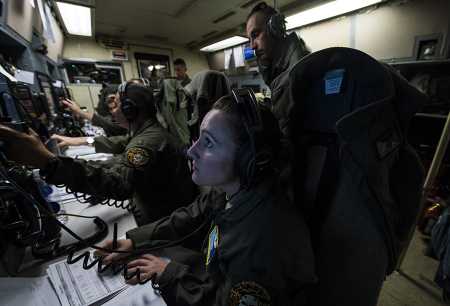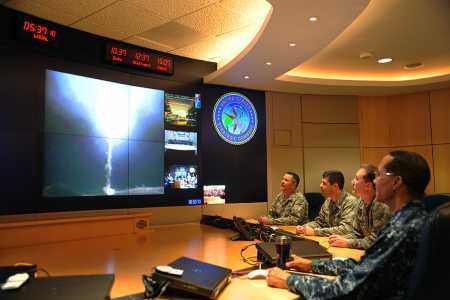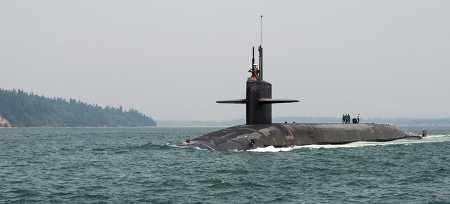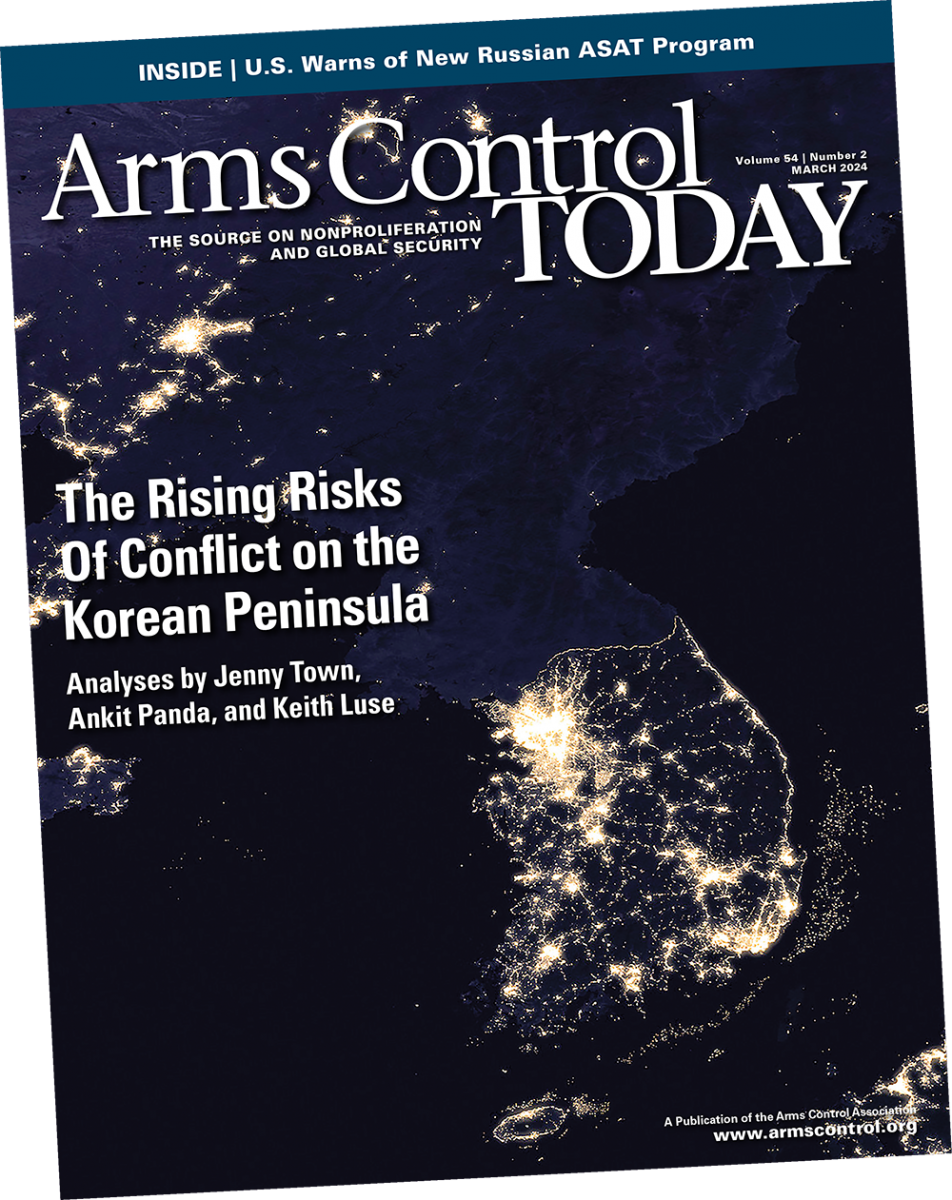Strengthening Checks on Presidential Nuclear Launch Authority
January/February 2018
By Bruce Blair
U.S. nuclear launch protocol has important virtues and serious liabilities. Major changes are needed to constrain a president who would seek to initiate the first use of nuclear weapons without apparent cause and to prevent him or her from being pushed into making nuclear retaliatory decisions in haste.
 The virtues of the protocol—the procedures and timelines for ordering the use of nuclear weapons and for carrying out such an order—are twofold. First, it concentrates launch authority at the highest level of the executive branch, the presidency, taking it out of the hands of the military and others. This is a function of paramount importance. The principle of civilian control over weapons of mass destruction must never be compromised. Together with the imposition of organizational and technical safeguards on the weapons and their handlers, the protocol elevates the locus of launch capability, as well as of launch authority, to the highest practical level.1
The virtues of the protocol—the procedures and timelines for ordering the use of nuclear weapons and for carrying out such an order—are twofold. First, it concentrates launch authority at the highest level of the executive branch, the presidency, taking it out of the hands of the military and others. This is a function of paramount importance. The principle of civilian control over weapons of mass destruction must never be compromised. Together with the imposition of organizational and technical safeguards on the weapons and their handlers, the protocol elevates the locus of launch capability, as well as of launch authority, to the highest practical level.1
Second, it is designed to allow the president and the nuclear forces under his command to respond rapidly and decisively in the face of an enemy attack by nuclear-armed missiles that can fly from the opposite side of the planet to U.S. territory in 30 minutes or from forward-deployed submarines in 15 minutes.2 This is of critical importance in view of the acute vulnerability of U.S. nuclear command, control, and communications, as well as of a large portion of the U.S. strategic nuclear arsenal, particularly the silo-based missile force and the bomber fleet in its normal peacetime posture.3
Despite fast-flying inbound warheads, the protocol on paper provides enough time for detecting and assessing an attack, convening an emergency conference between the president and his top nuclear advisers, briefing the president on his options and their consequences, authenticating the president’s decision, and formatting and transmitting a launch order to the launch crews in time to ensure the survival and execution of their forces.
The flip side of these virtues are serious liabilities. The protocol concentrates authority and emphasizes speed to such a degree that it may allow a president to railroad the nuclear commanders into initiating a first strike without apparent cause and quickly executing an order that may be horrifyingly misguided, illegal, or both. A demented commander-in-chief could start a nuclear conflagration that no one could forestall, veto, or stop.
Equally deleterious, a president can become hostage to the protocol itself, like a conductor on a runaway train, if an enemy nuclear strike appears underway. He may be pushed into hastily ordering “retaliation” in response to a false alarm. Rationality would be lost in the fog of crisis under a short deadline fraught with confusion and emotion.
Protocol for Intentional First Use
If the president wishes to order the first use of nuclear weapons, he would be expected to do so in close consultation with his top national security advisers, particularly the secretaries of defense and state (statutory advisers on the National Security Council), the chairman of the Joint Chiefs of Staff, the national security adviser, and the senior generals who command the military forces. Depending on the urgency of the situation, this could be a protracted process with extensive planning, heightened force readiness, and regular briefings of the president, or it could be truncated to minutes if an imminent attack is perceived.
 When a decision is imminent, the process goes critical. The commander-in-chief would be connected to his key advisers via a secure communications network designed to support nuclear emergency actions. The president could initiate this conference anytime, even abruptly in the night, through his military aide who is always nearby with the “football”—a satchel containing the nuclear war plans, including a one-pager graphically depicting the major options at his disposal.
When a decision is imminent, the process goes critical. The commander-in-chief would be connected to his key advisers via a secure communications network designed to support nuclear emergency actions. The president could initiate this conference anytime, even abruptly in the night, through his military aide who is always nearby with the “football”—a satchel containing the nuclear war plans, including a one-pager graphically depicting the major options at his disposal.
The best location for conferencing would be the blast-resistant emergency operations center under the East Wing of the White House. Advisers could be assembled there, and others linked by secure phone. Such a conference could be convened almost anywhere, from Mar-a-Lago or other locations or aboard his ground-transport vehicles and dedicated aircraft, including Air Force One and his “doomsday” plane.4 Secure communications are far less reliable when the president is traveling or in the process of being evacuated to a safe location.
The advisers may or may not join the conference in a timely way. If a brewing crisis suddenly escalates and catches them off guard, key advisers may fail to get on the call before a president decides the time to strike has arrived. During nuclear release exercises and real-world incidents involving North Korea and other nations over the past decade, missile launch preparations or actual firings posing a potential threat triggered emergency conferences, but notification often failed to reach key advisers in time. Sometimes none of the advisers checked in, leaving the president and the head of Strategic Command (StratCom), whose role is to brief the president on nuclear options and their consequences, alone in the hot seats.5
After this briefing, the president may seek advice from any, all, or none of the advisers in the room or on the telephone before rendering a decision, which likely but not necessarily involves choosing a preprogrammed option.6 Formally, he does not need any approval or consent, although StratCom or others on the call could attempt to dissuade the president if his thinking or final decision veer into the realm of the obviously misguided or illegal.7 Even the defense secretary has no particular role other than offering advice if asked. Contrary to widespread belief, he does not confirm the order or otherwise bless it in any way. But this is their last chance to change the president’s mind before a formal launch order is prepared by the Pentagon, disseminated, and inexorably implemented.
Listening in on the exchange is the Pentagon war room, a kind of boutique service dedicated to executing the orders of the president and the defense secretary.8 Following the drift of the conversation, this entity would start preparing a launch order. When the president finally declares his choice of option, it would challenge the president to authenticate using a special code known as the “biscuit,” or Gold Code. This would take a few seconds. If the codes match properly, it would quickly format and transmit a launch order over multiple communications channels directly to the submarine, bomber, and underground launch crews.
This would take a couple of minutes. Shorter than the length of a “tweet,” the order would specify the war plan, the time to begin the strike, an unlock code needed by the firing crews to release their weapons, and a Sealed Authentication Code that must match the codes in the firing crews’ safe. If the codes match, the crews assume the order originated with the president, even though all the codes in the launch order are held exclusively by the Pentagon war room and alternate command centers such as StratCom itself.
The underground Minuteman crews could complete their launch checklist in a little more than a minute. Today, as many as 400 missiles could be launched from their underground silos in less than five minutes after the president gave the order.9
Submarines and bombers would be the primary attackers in a scenario involving North Korea. With two boats typically on launch-ready patrol in the Pacific Ocean, the sub force would be capable of quickly firing about 200 warheads roughly 15 minutes after the president gave the order.10 If the order came without a prior raising of alert readiness, however, the boats would surface to confirm its validity.
Bombers on full alert with bombs and cruise missiles loaded,11 as they would be in times of heightened tension, would need eight hours or so to fly from their U.S. bases to near the border of their target countries, where they would fire cruise missiles at inland targets or proceed to fly into enemy airspace to drop gravity bombs. They could deliver upward of 500 weapons.
Protocol for Second-Strike Scenarios
A decision to strike back in retaliation theoretically could be drawn out for days and weeks, but the protocol is designed to yield one in minutes. The basic procedures are the same for first and second use of nuclear weapons, but the timelines shrink in the latter case. Reactions from the bottom to the top of the chain of command to an apparent attack are driven by checklists and virtually preordained. The action could be described as a rote enactment of a prepared script with very high expectations in all quarters that a nuclear response would be authorized immediately.
 Historically, the notion of riding out an attack has been operationally anathema to the military. As General Lee Butler, a former head of the strategic forces, stated, “Our policy was premised on being able to accept the first wave of attacks…. Yet at the operational level it was never accepted…. They built a construct that powerfully biased the president’s decision process toward launch before the arrival of the first enemy warhead…a move in practice to a system structured to drive the president invariably toward a decision to launch under attack.”12
Historically, the notion of riding out an attack has been operationally anathema to the military. As General Lee Butler, a former head of the strategic forces, stated, “Our policy was premised on being able to accept the first wave of attacks…. Yet at the operational level it was never accepted…. They built a construct that powerfully biased the president’s decision process toward launch before the arrival of the first enemy warhead…a move in practice to a system structured to drive the president invariably toward a decision to launch under attack.”12
This is called “jamming” the president, or pressuring him to quickly authorize retaliation while under apparent or confirmed attack.13 Jamming is still the norm in current nuclear operations. Although President Barack Obama directed the Pentagon to reduce our reliance on launch on warning and find ways to increase warning and decision time, nuclear exercises still feature this high-pressure tactic. In some high-threat situations, the StratCom commander’s briefing of the president may be compressed to as little as 30 seconds, and then the president may be pressed to “deliberate and decide” in six minutes or less.
The persistent vulnerability of the nuclear command system and hundreds of U.S. missiles requires extremely fast reaction at all levels. In truth, everyone gets jammed. The risk of mistaken launch on false warning remains significant even today, 25 years after the end of the Cold War. It also creates pressure to pre-empt an imminent attack.
To relieve the jamming pressure today, the protocol must start earlier and under conditions of greater uncertainty about the degree of threat posed by missile launch preparations or actual firings. During the Cold War, even the really close calls did not rise to the level of presidential notification.14 Today, there are more missile launches than ever to track, and assessing whether they pose a threat has become more difficult.15
Ironically this surge, which has happened over the past decade or so, has spawned great unpredictability, complicated assessment, and led on multiple occasions to presidents being notified of an ambiguous imminent threat in progress.16
Reforms: Toward a True Retaliatory Posture
A six-minute deadline for deliberation and decision is ridiculous. The president needs much more warning and decision time to rationally cope with indications of a nuclear attack on the United States or its allies. He must no longer be jammed to authorize what could be a civilization-ending response to attack indications that may be false. The risks of miscalculation and irrational decision-making leading to incoherent operations and further escalation are unacceptably high.
This terrifying reality has been ignored for decades. Reform is long overdue.
 This means that the current prompt-launch posture must be drastically altered. Use-or-lose forces such as the silo-based missile force should be eliminated. Launch on warning should be eliminated. Reducing the vulnerability of command, control, and communications to kinetic attack and cyberattack should be the top priority of the nuclear modernization plan, even if it means cutting spending on replacement forces in the pipeline. The submarine force has already become the premier leg of the strategic triad, the central component of U.S. deterrence policy. This force can patiently wait for months for direction from higher authority.
This means that the current prompt-launch posture must be drastically altered. Use-or-lose forces such as the silo-based missile force should be eliminated. Launch on warning should be eliminated. Reducing the vulnerability of command, control, and communications to kinetic attack and cyberattack should be the top priority of the nuclear modernization plan, even if it means cutting spending on replacement forces in the pipeline. The submarine force has already become the premier leg of the strategic triad, the central component of U.S. deterrence policy. This force can patiently wait for months for direction from higher authority.
Equally overdue is the adoption of a policy that eschews the first use of nuclear weapons. A clear marker would be established in limiting the president’s leeway to initiate a first strike.17 If taken seriously, the operational plans would also be modified in ways that would hamstring any effort to order the use of nuclear weapons without apparent cause.
Congress has considerable legal standing to pass legislation that prohibits first use. A recent bill introduced by Representative Adam Smith (D-Wash.) is a step in this direction,18 but a law would draw real redlines around the policy. Crossing them would make the president accountable and even impeachable.
The Trump administration appears to be heading in the opposite direction. Its nuclear review in the works is leaning toward the deployment of smaller-yield nuclear weapons (e.g., a primary-only warhead on Trident missiles) that will make them more usable in both first- and second-use scenarios. It is also leaning toward widening the conditions under which nuclear weapons may be used first in response to non-nuclear strategic aggression and toward revoking Obama-era assurances given to non-nuclear countries that the United States would never attack them with nuclear weapons.
The key challenge is moving to a true retaliatory posture19 that allows the president and his successors to provide enduring command and control over the submarine force. The nuclear protocol would thus place priority on their quick and safe evacuation to survivable and enduring command centers.
Other Promising Reforms
No single reform suffices. A combination of reforms is needed to reduce risk.
The Markey-Lieu bill. The premise of this bill is that employing nuclear weapons is tantamount to going to war and this responsibility belongs to the U.S. Congress, not the president, under Article 1 of the U.S. Constitution.20 The president therefore is to be prohibited from employing nuclear weapons first unless Congress has declared war and provided specific authorization for their use. The president would still retain the authority to order their use in the event of a confirmed nuclear attack against the United States or U.S. allies.
The bill might tie the president’s hands too much in some situations, such as an imminent and seemingly irrevocable nuclear strike by a country such as North Korea. Even if it did not, it might take too long to secure congressional approval. Additionally, if specific authorization is granted but the crisis drags on or takes a turn in unanticipated directions, the president would remain empowered and could still unilaterally make a terribly bad call later.
 The Betts/Waxman solution. Among the many proposals for adding more people to the chain of command, one of the strongest is to require the defense secretary to confirm that a presidential first-use order came from the president and the attorney general to certify that it is a legal order.21 This reform would address the growing danger of cyber intrusion generating deceptive presidential commands and authentications, and it adds a high-level legal oversight to first-use decisions. If the latter is going to be more than a rubber stamp, however, much deeper consideration of the legal issues will have to be undertaken and firm guidelines drawn in advance.
The Betts/Waxman solution. Among the many proposals for adding more people to the chain of command, one of the strongest is to require the defense secretary to confirm that a presidential first-use order came from the president and the attorney general to certify that it is a legal order.21 This reform would address the growing danger of cyber intrusion generating deceptive presidential commands and authentications, and it adds a high-level legal oversight to first-use decisions. If the latter is going to be more than a rubber stamp, however, much deeper consideration of the legal issues will have to be undertaken and firm guidelines drawn in advance.
Although it is debatable whether Congress has the standing to dictate the chain of command within the executive branch, whose commander-in-chief possesses clear authority over the armed forces under Article 2 of the U.S. Constitution, Congress could press the Pentagon to devise its own solution that thickens the protocol with additional heads. Congress could exert its power over the purse to encourage compliance, for instance by withholding funds for nuclear modernization until the executive branch reformed the protocol in a satisfactory way.
Deepening consultation with Congress. In order to further check and balance the first-use authority vested in the president, Congress should pass legislation requiring the defense secretary to consult closely with the top four leaders of the Senate and House, as well as the chairs and ranking members of the committees responsible for defense spending, on matters pertaining to U.S. nuclear war plans. These leaders would be given greater access to the wartime plans that govern conventional and nuclear operations and be apprised of any changes to those plans that move the nation closer to their implementation. The defense secretary would be held accountable for timely briefings and answer sessions to ensure that these congressional leaders will be informed of pending military actions and able to assert their war powers and if necessary bring the full Congress into the debate. He would also be required to inform the president, vice president, and national security adviser if ongoing nuclear mission planning does not accord with the consensus view of congressional leaders.
Should the president’s operational direction of the nuclear forces overstep the consensus of the congressional leaders, particularly if it entails the first use of nuclear forces, the vice president could consider whether the president’s state of mind warranted invoking the 25th Amendment.
The Nuremburg solution. Both a former and the current head of StratCom recently claimed publicly that disobeying an illegal nuclear strike order offers a safeguard against a president gone berserk.22 They were attempting to allay the widespread concern about the temperament and character of the current commander-in-chief and the perception that the nuclear forces are under erratic and unreliable control. If not staunched, these worries could generate public hysteria and put the $1.3 trillion 30-year nuclear modernization program in jeopardy.
The assurances of the generals were not very convincing. First, a launch order normally would be transmitted by the Pentagon directly to the firing crews at the bottom of the chain, and StratCom and other senior military commanders receiving it at the same time could not interfere at this late stage. StratCom could scramble to issue a termination order but it would almost certainly arrive too late to stop the launch.23 Second, their comments suggested that they could not refuse a horrifyingly bad call by the president, but rather only an illegal one. Third, insubordination seems a weak reed to lean on given the deep-seated obedience to civilian control engrained in military culture, training, and its code of justice. By the same token, to the extent that it would be an effective safeguard, it may well undermine the sacred tenet of civilian control over the military. Fourth, they provided no clues as to what would constitute an “illegal” order and indeed created the impression that they would defer broadly to a president’s judgment of what constitutes an imminent threat warranting a pre-emptive or even preventive first strike. There was no opinion proffered, for instance, that President Donald Trump’s threat to prevent North Korea from acquiring the ability to deliver a nuclear warhead by missile to any target in the United States would be illegal if it means mounting a preventive conventional or nuclear strike, and no clear indication that the military would ever resist such orders on legal grounds.
The literature on the law of war, international humanitarian law, and other constraints on the use of force such as Articles 2 and 51 of the UN Charter, a treaty to which the United States is bound by law to observe, indicates that much is amiss already in U.S. nuclear war planning. It is a stretch indeed to reconcile these legal tenets with a nuclear target plan that includes upward of 1,500 nuclear aim-points, many hundreds located inside cities in Russia, China, North Korea, and Iran.24
The target plans have already been vetted by military lawyers and legally certified for prosecution under certain circumstances, a fact that plants serious doubt that legal desiderata have been applied scrupulously. Dubious rationales such as “belligerent reprisal” to justify killing millions of civilians, departures from the law of war (proportionality, distinction, and necessity), and the self-defense clause of the UN Charter to justify pre-emption and even preventive strikes appear to be too readily invoked.25
The absence of crystal clarity in this arena begs for elucidation. The time is ripe for a reckoning of the legality of specific nuclear plans on the books, a serious endeavor to teach and train nuclear commanders in this area, and the international court of justice to revisit the question of the legality of using nuclear weapons.
Extralegal back channels. During the dark days of the Watergate scandal engulfing President Richard Nixon, Defense Secretary James Schlesinger and Secretary of State Henry Kissinger reportedly instructed the Pentagon to check with them before carrying out any strange orders from Nixon.26 This may have been a prudent intervention, however dubious in legal terms, but it represents only a stopgap measure that is not reliable and sets a bad precedent with insidious long-term effects on presidential governance. It is notable that these secretaries were civilians without military backgrounds. The current crop of senior advisers surrounding Trump are former senior generals who lack any proclivity to conspire against the commander-in-chief.
25th Amendment to the U.S. Constitution. Should a president bark out an obviously illegal order, senior officials could notify the vice president in a bid to invoke the 25th Amendment. It provides a mechanism for the vice president to become the acting president. If the vice president secures in writing the concurrence of one-half or more of the Cabinet secretaries declaring the inability of the president to perform his duties for physical or mental reasons, then the vice president takes over as soon as this letter is delivered to the leaders of Congress. Unfortunately, the launch protocol is so streamlined that this constitutional intervention may prove too slow and cumbersome, but it does provide a potential recourse in some situations.
Enforce the War Powers Act of 1973. The law allows the president to send U.S. troops into combat for 60 days without congressional approval, during which time Congress must authorize the mission or else the troops must be withdrawn within 30 days after the 60-day grace period expires. Yale law professor Bruce Ackerman, the pre-eminent authority on this law, argues that the 60-day period begins when the president threatens to commit the forces,27 a somewhat controversial interpretation that suggests Trump’s tweeting and talking about destroying North Korea already started the 60-day clock, which has now run out. Congress has been too reluctant to exercise its war powers and needs to assert them vigorously.
ENDNOTES
1 These safeguards are the “two-person rule” prohibiting access or control by any single person other than the president, and the locking of weapons to prevent their use electro-mechanically unless and until unlock codes are provided to the firing crews. The unlock and launch authorization codes needed by the bomber, silo-based missile, and submarine crews are held exclusively by high-level military command centers, not the president. The locking devices were installed on these strategic forces in 1970, 1977, and 1997, respectively.
2 Bruce Blair, “Trump Could Face a Nuclear Decision Soon,” Politico, November 16, 2016, https://www.politico.com/magazine/story/2016/11/trump-north-korea-nuclear-crises-214457.
3 Although U.S. nuclear deterrence policy is conceptually predicated on the notion of maintaining a credible capability to absorb an enemy’s maximum assault and strike back with sufficient force to destroy the aggressor’s country, the practical reality is that these persistent vulnerabilities render the United States heavily reliant on extremely rapid reaction if an enemy attack is imminent or underway with incoming warheads streaking toward U.S. territory at four miles per second.
4 This plane is a militarized Boeing 747 airborne command post kept always on runway alert (home-based at Offutt Air Force Base near Omaha or forward-deployed at Andrews Air Force Base outside Washington) or shadowing the president during his travels abroad. It possesses all the codes needed to issue the “go-code” and the communications equipment to transmit it directly to the forces, including a five-mile-long trailing antenna to reach submarines.
5 In fact, he has become the primary initiator of the conference as a result of the surging proliferation of ballistic missiles and their prolific testing over the past decade.
6 A pre-planned option would take only minutes to execute. An innovated option could take hours to days.
7 David Welna, “What the Law of War Says About Nuclear Strikes,” NPR, November 29, 2017, https://www.npr.org/2017/11/29/567313562/what-the-law-of-war-says-about-nuclear-strikes.
8 This joint operations cell of the National Military Command Center is headed by a one-star flag officer. Normally, a colonel is the ranking officer on duty. See Ben Smith, “Kirk: ‘I Command the War Room in the Pentagon,’” Politico, May 21, 2010, https://www.politico.com/blogs/ben-smith/2010/05/kirk-i-command-the-war-room-in-the-pentagon-027162.
9 The Editors, “No One Should Have Sole Authority to Launch a Nuclear Attack,” Scientific American, August 1, 2017, https://www.scientificamerican.com/article/no-one-should-have-sole-authority-to-launch-a-nuclear-attack/. Although the missiles are normally aimed at the open ocean, changing them to their wartime targets, preset in the missile’s memory for aim-points in Russia, China, North Korea, or Iran, is as easy as changing TV channels. They would not be involved in a nuclear strike confined to North Korea because they would have to fly over Russia and risk triggering mistaken retaliation by Russia against the United States.
10 Dave Merrill, Nafeesa Syeed, and Brittany Harris, “To Launch a Nuclear Strike President Trump Would Take These Steps,” Bloomberg Politics, January 20, 2017, https://www.bloomberg.com/politics/graphics/2016-nuclear-weapon-launch/. The crew positions the boat at the proper launch depth (150 feet) and spins up the missiles’ gyroscopes for flight navigation to the designated targets. Missiles would emerge from their tubes one at a time every 15 seconds.
11 In peacetime, the entire nuclear bomber force is not armed with nuclear weapons. It takes 12-24 hours to load the weapons from local storage bunkers. Bruce G. Blair, “De-Alerting Strategic Forces,” in Reykjavik Revisited: Steps Toward a World Free of Nuclear Weapons, ed. George P. Shultz, Sidney D. Drell, and James E. Goodby (Stanford, CA: Hoover Institution Press, 2008), http://media.hoover.org/sites/default/files/documents/9780817949211_ch2.pdf .
12 Jonathan Schell, The Gift of Time (New York: Metropolitan Books, 1998), pp. 191-194.
13 Reason would likely be the first casualty, as U.S. presidents and their key advisers recognized. Zbigniew Brzezinski stated, “A sudden massive attack would put the American leaders under extraordinary psychological pressure, capable of inducing erratic behavior and hesitation.” Zbigniew Brzezinski, “From Arms Control to Controlled Security,” The Wall Street Journal, July 10, 1984. Brzezinski spoke from experience, having received a shocking call in the middle of the night in 1979 informing him of the launch of 220 Soviet submarine missiles at the United States. A second call indicated that 2,200 missiles were streaking toward the United States—an all-out first strike. His biggest worry at this stage was figuring out how he would convince a groggy president that this was the real thing requiring an immediate nuclear response. Zbigniew Brzezinski, in 2009 conversation with author. As he prepared to call President Jimmy Carter, he received a call ending the nightmare. A defective computer chip had caused the false alarm. See “The 3 A.M. Phone Call,” The National Security Archive, The George Washington University, March 1, 2012, https://nsarchive2.gwu.edu/nukevault/ebb371/.
14 There was much predictability in the U.S.-Soviet strategic confrontation. The United States knew much about Soviet missiles and their ranges and test practices. By mutual agreement, the United States received advance notification of their launches.
15 Over the past decade, countries in Asia having nuclear weapons—China, India, North Korea, and Pakistan—and Iran have accelerated their ballistic missile programs. Every day, events occur, often involving civilian or military missile launches, that require a look by the early-warning crews at Petersen and Offutt Air Force bases. They are tasked to provide a preliminary assessment whether North America is under nuclear missile attack within three minutes after receiving the first reports from satellites and ground radar.
16 This notification process now runs through two distinct channels, NORAD and StratCom, with the latter striving to get a head start and activating the protocol before an attack is confirmed or even before a missile lifts off from North Korea, China, Iran, or elsewhere.
17 In January 2017, Vice President Joseph Biden argued that “[g]iven our non-nuclear capabilities and the nature of today’s threats—it’s hard to envision a plausible scenario in which the first use of nuclear weapons by the United States would be necessary. Or make sense. President Obama and I are confident we can deter—and defend ourselves and our Allies against—non-nuclear threats through other means.” Joe Biden, “Remarks by the Vice President on Nuclear Security,” American Presidency Project, January 11, 2017, http://www.presidency.ucsb.edu/ws/index.php?pid=121419.
18 H.R.4415, 115th Cong. (2017).
19 Bruce G. Blair, Strategic Command and Control: Redefining the Nuclear Threat (Washington, DC: Brookings Institution Press, 1985), pp. 289-295.
20 Restricting First Use of Nuclear Weapons Act of 2017, H.R. 669, 115th Cong. (2017).
21 Richard K. Betts and Matthew Waxman, “Safeguarding Nuclear Launch Procedures: A Proposal,” Lawfare, November 19, 2017, https://www.lawfareblog.com/safeguarding-nuclear-launch-procedures-proposal.
The popular misconception that the defense secretary already plays a role may stem from the fact that he and the president constitute the “national command authorities.” It may also stem from the law that reorganized the Department of Defense in the 1980s. Under the Goldwater-Nichols Act, the chain of command is stipulated to run from the president to the defense secretary and then to the combatant commanders, but this law contains a loophole. It says this is the chain of command unless the president directs otherwise. See Goldwater-Nichols Department of Defense Reorganization Act of 1986, Pub. L. No. 99-433, 10 U.S.C. 111 (1986).
22 See Gen. C. Robert Kehler, Statement before the Senate Foreign Relations Committee, November 14, 2017, https://www.foreign.senate.gov/imo/media/doc/111417_Kehler_Testimony.pdf; Kathryn Watson, “Top General Says He Would Resist ‘Illegal’ Nuke Order From Trump,” CBS News, November 18, 2017, https://www.cbsnews.com/news/u-s-strategic-command-gen-john-hyten-resist-illegal-nuke-order-from-trump/.
23 Under some circumstances, StratCom would assume the duties of the Pentagon war room and would be in a position to withhold the transmission of a launch order. “U.S. General Says Nuclear Launch Order Can Be Refused, Sparking Debate,” Fox News, November 20, 2017, http://www.foxnews.com/politics/2017/11/20/generals-comments-on-illegal-nuclear-launch-by-president-sparks-debate.html.
24 The author estimates that there are 80 aim-points in North Korea; half that many in Iran; 900-plus in Russia, including 250 economic and 200 leadership aim-points largely concentrated in cities (100 in greater Moscow alone); and more than 400 in China, including 250 and 60 such economic and leadership aim-points, respectively.
25 For discussions on international law as it applies to nuclear weapons use, see Col. Charles J. Dunlap Jr., “Taming Shiva: Applying International Law to Nuclear Operations,” The Air Force Law Review, Vol. 41 (1997), pp. 163-165; Theodore T. Richard, “Nuclear Weapons Targeting: Evolution of Law and U.S. Policy,” Military Law Review, Vol. 224, No. 4 (2017): 862-978.
26 Garrett M. Graff, “The Madman and the Bomb,” Politico, August 11, 2017, https://www.politico.com/magazine/story/2017/08/11/donald-trump-nuclear-weapons-richard-nixon-215478.
27 Bruce Ackerman, “How to Stop Trump Blowing It Up,” The New York Review of Books, November 28, 2017, http://www.nybooks.com/daily/2017/11/28/how-to-stop-trump-blowing-it-up/.
Bruce Blair is a member of the Princeton University research faculty in the Program on Science and Global Security and co-founder of Global Zero, an international movement for the elimination of nuclear weapons.

